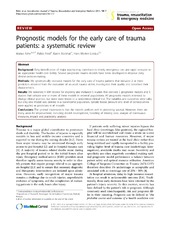Prognostic models for the early care of trauma patients: a systematic review
Peer reviewed, Journal article
Published version

Permanent lenke
https://hdl.handle.net/1956/4626Utgivelsesdato
2011-03-20Metadata
Vis full innførselSamlinger
Originalversjon
https://doi.org/10.1186/1757-7241-19-17Sammendrag
Background: Early identification of major trauma may contribute to timely emergency care and rapid transport to an appropriate health-care facility. Several prognostic trauma models have been developed to improve early clinical decision-making. Methods: We systematically reviewed models for the early care of trauma patients that included 2 or more predictors obtained from the evaluation of an adult trauma victim, investigated their quality and described their characteristics. Results: We screened 4 939 records for eligibility and included 5 studies that derivate 5 prognostic models and 9 studies that validate one or more of these models in external populations. All prognostic models intended to change clinical practice, but none were tested in a randomised clinical trial. The variables and outcomes were valid, but only one model was derived in a low-income population. Systolic blood pressure and level of consciousness were applied as predictors in all models. Conclusions: The general impression is that the models perform well in predicting survival. However, there are many areas for improvement, including model development, handling of missing data, analysis of continuous measures, impact and practicality analysis.
Utgiver
BioMed CentralOpphavsrett
Rehn et al.Copyright 2011 Rehn et al; licensee BioMed Central Ltd.
